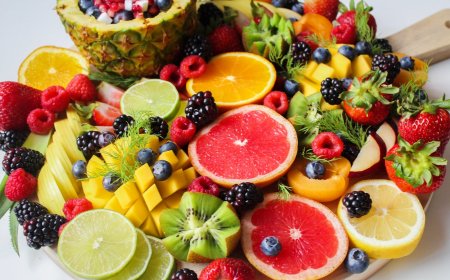The best foods to promote eye health
The best foods to promote eye health include dark leafy greens, fatty fish, eggs, and nuts. These foods contain antioxidants, vitamins, and healthy fats that contribute to strengthening vision and maintaining eye health.

The best foods to promote eye health include dark leafy greens, fatty fish, eggs, and nuts. These foods contain antioxidants, vitamins, and healthy fats that contribute to strengthening vision and maintaining eye health.
The best foods to promote eye health
Amazing foods are essential for enhancing eye health and maintaining good vision in the long run. These foods include dark leafy greens like spinach and kale, legumes, and fruits such as oranges and blueberries, which contain antioxidants and vitamins like vitamin C and vitamin E that work to protect the eyes from damage caused by free radicals. Additionally, foods rich in omega-3 fatty acids such as fatty fish and walnuts can reduce the risk of chronic eye diseases like glaucoma and macular degeneration. Therefore, it is recommended to regularly include these foods in the diet to maintain eye health and enhance good vision.
The secret of fish oils and walnuts
The secret of fish oils and walnuts lies in their remarkable impact on eye health and strength, as these healthy fats contain omega-3 fatty acids that play a crucial role in supporting and protecting the eyes. Research shows that omega-3 can reduce the risk of chronic eye diseases such as glaucoma and macular degeneration, thanks to its ability to reduce eye inflammation and improve blood flow to the retina, enhancing vision and maintaining overall eye health. Additionally, walnuts contain antioxidants and vitamins such as vitamin E and zinc, which contribute to strengthening vision and maintaining eye health. Therefore, it is important to regularly include these foods in the diet to effectively enhance vision and maintain eye health.
The amazing benefits of eggs for vision
The remarkable benefits of eggs for vision lie in their important role in promoting eye health and contributing to maintaining good vision. Eggs are a rich source of many nutrients beneficial for the eyes, starting from lutein and zeaxanthin, which are antioxidants that help protect the eyes from damage caused by ultraviolet rays and harmful free radicals, which may lead to deteriorating vision and various eye problems. Additionally, eggs contain vitamin A and carotenoids, essential nutrients for eye health, as they contribute to maintaining the integrity of eye tissues and strengthening vision. Furthermore, eggs provide a significant amount of essential proteins that help in building and maintaining eye tissues, enhancing visual capacity and improving the quality of vision. Therefore, including eggs in the daily diet is considered an important part of caring for eye health and achieving good vision in the long run.
The importance of antioxidants in strengthening vision and maintaining eye health
Antioxidants are of utmost importance in strengthening vision and maintaining eye health due to their ability to combat the harmful effects of free radicals, which may cause damage to eye tissues and deterioration in vision. Antioxidants are found in a variety of foods, such as fruits, vegetables, nuts, and seeds, and include vitamins such as vitamin C, vitamin E, beta-carotene, lutein, zeaxanthin, selenium, and zinc, all of which contribute to protecting the eyes from oxidative damage, ultraviolet radiation, and environmental pollution.
For example, vitamin C helps improve blood circulation to the eyes, enhancing the delivery of nutrients and oxygen to the visual tissues and improving vision. Meanwhile, vitamin E, selenium, and zinc work to protect eye tissues from oxidative damage, thus contributing to maintaining eye health and preventing eye problems. With their content of lutein and zeaxanthin, dark leafy greens such as spinach and kale strengthen and protect the retina from damage caused by blue light, thereby improving vision in low-light conditions and reducing the risk of problems like macular degeneration.
Analytical study of the best food sources
Vitamins significantly impact eye health and maintaining vision quality, playing a crucial role in enhancing eye functions and preventing associated diseases. There are numerous vitamins that notably affect eye health, including vitamin A, which strengthens the retina and maintains vision in low-light conditions, while also contributing to image formation on the retina. Additionally, vitamin C plays a significant role in enhancing blood vessels in the eye and improving blood flow to it, aiding in preventing the formation of cataracts and avoiding vision problems.
On the other hand, vitamin E acts as an antioxidant, protecting the eye from damage caused by free radicals and helping maintain healthy eye tissues. Research suggests that B-group vitamins such as B6, B9, and B12 may reduce the risk of retinal damage and maintain normal eye functions.
To obtain these vitamins conveniently for eye health, it is advisable to include food sources rich in them in the diet, such as dark leafy greens like spinach, kale, and broccoli, fruits like oranges and strawberries, nuts and seeds, and fatty fish like salmon and sardines. By utilizing an analytical study of the best food sources for these vitamins, individuals can be directed toward foods containing high levels of essential vitamins for eye health, which work to enhance vision and maintain good eye health.
A comprehensive nutrition plan for eye health
A comprehensive nutrition plan for eye health requires incorporating a variety of foods containing the necessary nutrients to support and protect the eyes. This dietary plan should include foods rich in vitamins such as A, C, and E, minerals like zinc and selenium, omega-3 fatty acids, and antioxidants.
To start off well, dark leafy greens like spinach and kale should be included in the diet, as they contain antioxidants like lutein and zeaxanthin that help protect the eyes from oxidative damage. It is also advisable to include dark-colored fruits such as purple grapes and blueberries, as they contain antioxidants and important vitamins for eye health.
For protein sources, fatty fish like salmon, tuna, and sardines are preferred, as they contain omega-3 fatty acids that help reduce the risk of eye diseases such as glaucoma and macular degeneration. Additionally, eggs, lean meats, nuts, and seeds can be added as good sources of protein and essential vitamins and minerals for eye health.
The importance of healthy fats should not be underestimated in the comprehensive dietary plan, with recommendations to consume healthy oils such as olive oil and canola oil, in addition to walnuts, seeds, and avocados as good sources of monounsaturated and polyunsaturated fats that support and protect eye health.
Overall, the dietary plan should be diverse and balanced, including a variety of foods rich in essential nutrients for eye health, while avoiding foods high in saturated fats, added sugars, and excessive salt, as they may negatively impact eye health and cause problems such as vision impairment and dry eyes.
Healthy Nutrition and Good Vision
Healthy nutrition plays a crucial role in maintaining healthy vision and strong eye health. To achieve optimal balance in the dietary regimen for eye health, there are several points to consider
1. Including dark leafy greens: Spinach, kale, and broccoli contain antioxidants like lutein and zeaxanthin, which work to protect the eyes from damage caused by ultraviolet rays.
2. Consuming foods rich in vitamin A: Such as carrots, pumpkin, and squash, as vitamin A contributes to strengthening night vision and maintaining corneal health.
3. Diversity in consuming fruits and vegetables: Within the dietary regimen, eat a variety of fruits and vegetables in different colors to ensure the provision of all necessary vitamins and minerals for eye health.
4. Consuming omega-3 fatty acids: It is important to include sources of omega-3 fatty acids such as fatty fish (salmon and tuna), walnuts, and flaxseeds, as these fats play a role in protecting the eyes from age-related diseases such as glaucoma and macular degeneration.
5. Avoiding unhealthy fats: Reducing the consumption of saturated and trans fats in the diet can decrease the risk of developing eye diseases such as cataracts and glaucoma.
6. Drinking an adequate amount of water: Drinking enough water contributes to maintaining eye moisture and preventing dry eyes.
By maintaining these healthy dietary habits and regularly incorporating the mentioned foods into the diet, vision can be enhanced and eye health can be preserved in the long term.
Summary
Eye health is vital and can be enhanced by incorporating specific foods into the diet. These foods include dark leafy greens like spinach and kale, vibrant-colored fruits like oranges and blueberries, fatty fish like salmon and sardines, eggs, and nuts. These foods contain antioxidants, vitamins, minerals, and essential fatty acids that work to protect the eyes from oxidative damage, improve blood circulation to the eyes, strengthen the retina, and maintain vision. By regularly including these foods in the diet, eye health can be promoted, contributing to maintaining good vision in the long term.
Sources
1. Foods for Eye Health: An Overview from WebMD
3. The Best Foods for Eye Health from Healthline
4. 10 Foods to Boost Eye Health from American Academy of Ophthalmology
What's Your Reaction?












































































































